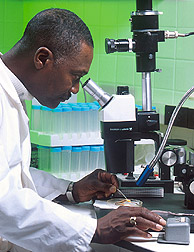 |
| Stock photo courtesy Wikipedia |
The study presents the early results of a first phase clinical trial that aims to establish safe and effective doses of the drug, called ulixertinib. Such phase I clinical trials test a range of doses to determine first, whether the drug can slow or halt the progress of the cancer, and determine the side effects as well. The study results appear in Cancer Discovery, the journal of the American Association of Cancer Research.
In this study 27 patients were given different doses of the drug. With the optimal dose established, another 108 patients were give the drug in what is called the dose-expansion phase. All the patients had a variety of advanced solid tumors with the genetic mutations targeted by the drug.
Early results showed that 12 percent of patients responded at the low initial trial dose of the drug and 14 percent responded in the optimal dose expansion phase of the trial. Response at this stage of testing is the first indication that the drug may be effective. Longer study is needed to determine if the tumors shrink and how long the tumor growth is halted or reversed.
These early results have earned ulixertinib Fast Track designation by the FDA, which means the drug is showing superior effectiveness in a condition with no current therapy. The fast track gives the drug developer expedited meetings with the FDA to discuss and present data needed for approval.


No comments:
Post a Comment